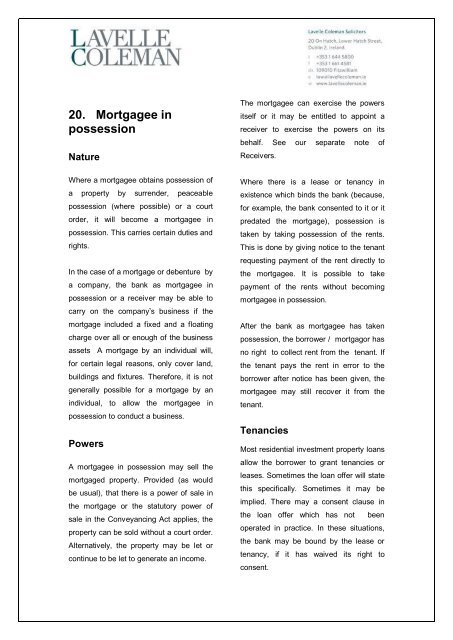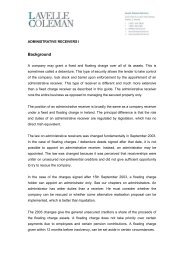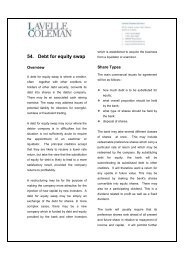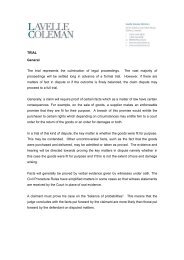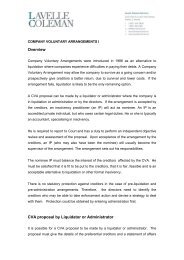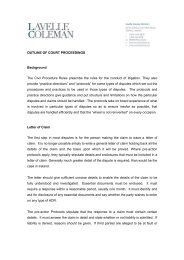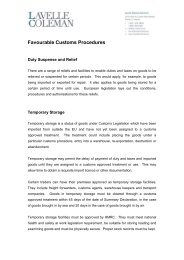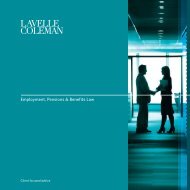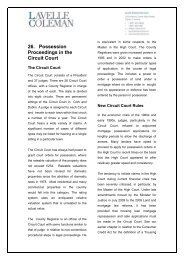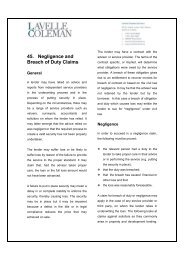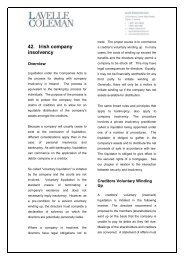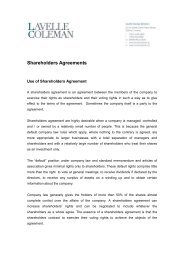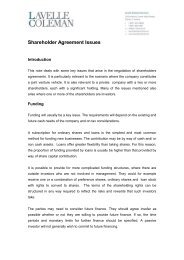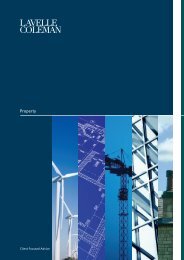20. Mortgagee in possession - Lavelle Coleman
20. Mortgagee in possession - Lavelle Coleman
20. Mortgagee in possession - Lavelle Coleman
Create successful ePaper yourself
Turn your PDF publications into a flip-book with our unique Google optimized e-Paper software.
<strong>20.</strong> <strong>Mortgagee</strong> <strong>in</strong><br />
<strong>possession</strong><br />
Nature<br />
Where a mortgagee obta<strong>in</strong>s <strong>possession</strong> of<br />
a property by surrender, peaceable<br />
<strong>possession</strong> (where possible) or a court<br />
order, it will become a mortgagee <strong>in</strong><br />
<strong>possession</strong>. This carries certa<strong>in</strong> duties and<br />
rights.<br />
In the case of a mortgage or debenture by<br />
a company, the bank as mortgagee <strong>in</strong><br />
<strong>possession</strong> or a receiver may be able to<br />
carry on the companys bus<strong>in</strong>ess if the<br />
mortgage <strong>in</strong>cluded a fixed and a float<strong>in</strong>g<br />
charge over all or enough of the bus<strong>in</strong>ess<br />
assets A mortgage by an <strong>in</strong>dividual will,<br />
for certa<strong>in</strong> legal reasons, only cover land,<br />
build<strong>in</strong>gs and fixtures. Therefore, it is not<br />
generally possible for a mortgage by an<br />
<strong>in</strong>dividual, to allow the mortgagee <strong>in</strong><br />
<strong>possession</strong> to conduct a bus<strong>in</strong>ess.<br />
Powers<br />
A mortgagee <strong>in</strong> <strong>possession</strong> may sell the<br />
mortgaged property. Provided (as would<br />
be usual), that there is a power of sale <strong>in</strong><br />
the mortgage or the statutory power of<br />
sale <strong>in</strong> the Conveyanc<strong>in</strong>g Act applies, the<br />
property can be sold without a court order.<br />
Alternatively, the property may be let or<br />
cont<strong>in</strong>ue to be let to generate an <strong>in</strong>come.<br />
The mortgagee can exercise the powers<br />
itself or it may be entitled to appo<strong>in</strong>t a<br />
receiver to exercise the powers on its<br />
behalf. See our separate note of<br />
Receivers.<br />
Where there is a lease or tenancy <strong>in</strong><br />
existence which b<strong>in</strong>ds the bank (because,<br />
for example, the bank consented to it or it<br />
predated the mortgage), <strong>possession</strong> is<br />
taken by tak<strong>in</strong>g <strong>possession</strong> of the rents.<br />
This is done by giv<strong>in</strong>g notice to the tenant<br />
request<strong>in</strong>g payment of the rent directly to<br />
the mortgagee. It is possible to take<br />
payment of the rents without becom<strong>in</strong>g<br />
mortgagee <strong>in</strong> <strong>possession</strong>.<br />
After the bank as mortgagee has taken<br />
<strong>possession</strong>, the borrower / mortgagor has<br />
no right to collect rent from the tenant. If<br />
the tenant pays the rent <strong>in</strong> error to the<br />
borrower after notice has been given, the<br />
mortgagee may still recover it from the<br />
tenant.<br />
Tenancies<br />
Most residential <strong>in</strong>vestment property loans<br />
allow the borrower to grant tenancies or<br />
leases. Sometimes the loan offer will state<br />
this specifically. Sometimes it may be<br />
implied. There may a consent clause <strong>in</strong><br />
the loan offer which has not been<br />
operated <strong>in</strong> practice. In these situations,<br />
the bank may be bound by the lease or<br />
tenancy, if it has waived its right to<br />
consent.
See our separate chapters <strong>in</strong> relation to<br />
residential and commercial property<br />
management. There may be a fixed term<br />
lease, <strong>in</strong> which case, the bank is bound to<br />
wait until after it expires to obta<strong>in</strong> vacant<br />
<strong>possession</strong>. There may be a roll<strong>in</strong>g<br />
tenancy from period to period. It is<br />
generally possible to term<strong>in</strong>ate a roll<strong>in</strong>g<br />
tenancy <strong>in</strong> order to sell the property.<br />
Roll<strong>in</strong>g residential tenancies have certa<strong>in</strong><br />
protections after six months.<br />
The bank may choose to sell a property<br />
under its power of sale with the tenant <strong>in</strong><br />
place. This may be the most appropriate<br />
means of realis<strong>in</strong>g the security. The bank<br />
has some general obligations <strong>in</strong> relation<br />
to how it exercises its power of sale.<br />
Unless there was some f<strong>in</strong>ancial good<br />
reason to the contrary, a sale with a tenant<br />
<strong>in</strong> place will be permissible. If a much<br />
higher price could be obta<strong>in</strong>ed with vacant<br />
<strong>possession</strong>, there may be a duty to obta<strong>in</strong><br />
<strong>possession</strong>.<br />
If the tenancy does not b<strong>in</strong>d the bank<br />
(because for example, it was made without<br />
consent), the bank is not entitled to<br />
demand rent as such. However, the bank<br />
may create a new tenancy by request<strong>in</strong>g<br />
and accept<strong>in</strong>g rent. Alternatively, the bank<br />
may take action for <strong>possession</strong> of the<br />
property. Peaceable <strong>possession</strong>, other<br />
than by way of the tenants surrender, is<br />
not usually possible with residential<br />
property. A Private Residential Tenancies<br />
Board order is usually required.<br />
A mortgagee <strong>in</strong> <strong>possession</strong> of land may<br />
accept surrenders of leases and grant new<br />
leases under certa<strong>in</strong> conditions set out <strong>in</strong><br />
the Conveyanc<strong>in</strong>g Act. The powers may<br />
be delegated to a receiver.<br />
Furniture and Movables<br />
When a tenancy or lease of furnished<br />
property is <strong>in</strong> be<strong>in</strong>g, the mortgagee under<br />
a mortgage by an <strong>in</strong>dividual will have no<br />
claim to the movables and furniture.<br />
Strictly speak<strong>in</strong>g, it is necessary to<br />
apportion the rent between the build<strong>in</strong>gs,<br />
land and fixtures on the one hand and<br />
movable items / contents on the other<br />
hand. Contents and movables may be<br />
<strong>in</strong>cluded <strong>in</strong> the lett<strong>in</strong>g, even though they<br />
belong to the borrower.<br />
If furniture or other effects are left <strong>in</strong> the<br />
property, a mortgagee <strong>in</strong> <strong>possession</strong> may<br />
obta<strong>in</strong> an order for their removal.<br />
Potentially, the borrower could be <strong>in</strong><br />
breach of court order and be liable for<br />
contempt of court if he fails to remove<br />
them. Alternatively, if a judgment for the<br />
debt is executed, the sheriff may enforce<br />
aga<strong>in</strong>st the goods.<br />
Movable items on a premises may be an<br />
impediment. A mortgagee <strong>in</strong> <strong>possession</strong> is<br />
generally entitled to remove an<br />
impediment. It may be entitled to the cost<br />
of removal. The mortgagee is generally<br />
allowed to store movables and to add the<br />
storage costs and expenses to the debt,
provided they are justifiable. Alternatively,<br />
the mortgage itself may specify what is to<br />
happen.<br />
Application of Proceeds<br />
A mortgagee is obliged to apply the<br />
receipts from the property, such as rents<br />
and profits as follows<br />
v pay<strong>in</strong>g outgo<strong>in</strong>gs;<br />
v pay<strong>in</strong>g <strong>in</strong>terest on prior mortgages;<br />
v pay<strong>in</strong>g costs and expenses;<br />
v pay<strong>in</strong>g <strong>in</strong>terest on the mortgage;<br />
v pay<strong>in</strong>g any surplus to the person next<br />
entitled, which may be the mortgagee,<br />
<strong>in</strong> reduction of the pr<strong>in</strong>cipal.<br />
A mortgagee who takes <strong>possession</strong> is not<br />
allowed to take any advantage beyond<br />
secur<strong>in</strong>g payment of the mortgage. It must<br />
use reasonable diligence to use the<br />
property <strong>in</strong> order to realise the money due,<br />
hav<strong>in</strong>g regard to the fact that the property<br />
may ultimately be restored to the<br />
mortgagor, if there is a surplus.<br />
A mortgagee must account for rent and<br />
profit actually received and also rents and<br />
profits which would have been received,<br />
but for its willful default. The mortgagee<br />
must therefore take reasonable care to<br />
maximise the return from the property.<br />
This duty is often modified by the terms of<br />
the mortgage.<br />
The person to whom the mortgagee must<br />
account for any surplus (if any) depends<br />
on who is <strong>in</strong>terested <strong>in</strong> the property after<br />
the mortgagee. There may be a second<br />
mortgage. If there is none, the person to<br />
whom account is made, is the borrower /<br />
owner.<br />
A mortgagee <strong>in</strong> <strong>possession</strong> cannot charge<br />
a commission, but can recover necessary<br />
outlay and expenses. A mortgagee <strong>in</strong><br />
<strong>possession</strong> is generally entitled to claim<br />
the cost of rent collection and agents<br />
expenses. If the mortgagee <strong>in</strong> <strong>possession</strong><br />
manages the property through an agent or<br />
employees, it may generally charge for<br />
their salaries. The mortgagee is not<br />
generally allowed anyth<strong>in</strong>g for its own<br />
<strong>in</strong>ternal costs <strong>in</strong> collect<strong>in</strong>g rents, although<br />
the mortgage may provide that a<br />
commission is payable.<br />
Duties of <strong>Mortgagee</strong><br />
If the mortgagee itself takes <strong>possession</strong><br />
and uses the property, it would be obliged<br />
to pay rent for occupation. This is not the<br />
case, if the occupation is for the purpose<br />
of a sale with<strong>in</strong> a reasonable time.<br />
If a property is vacant and it is appropriate,<br />
the mortgagee should attempt to let it at a<br />
proper rent. However, there is no duty to<br />
do so, if this would impede the sale or if<br />
the tenant might obta<strong>in</strong> statutory rights.<br />
A mortgagee will only be liable <strong>in</strong> respect<br />
of rent he would have received, if the
failure to receive it is due to his default,<br />
mismanagement or fraud. This could arise<br />
by removal of a satisfactory tenant, by<br />
lett<strong>in</strong>g it at undervalue or by mak<strong>in</strong>g<br />
improper use of the property.<br />
A mortgagee <strong>in</strong> <strong>possession</strong> must take<br />
reasonable care not to damage or neglect<br />
the property. It must take reasonable steps<br />
to protect the property such as secur<strong>in</strong>g it<br />
aga<strong>in</strong>st vandals. The mortgagee should<br />
<strong>in</strong>sure the property. The mortgagee is<br />
entitled to add to the mortgage debt, the<br />
reasonable and proper expenses <strong>in</strong>curred<br />
<strong>in</strong> preserv<strong>in</strong>g the property from damage.<br />
The pr<strong>in</strong>ciple of salvage give priority <strong>in</strong><br />
respect of certa<strong>in</strong> necessary expenditure,<br />
even where that priority would not<br />
otherwise be available.<br />
A mortgagee <strong>in</strong> <strong>possession</strong> may make<br />
reasonable improvements to the property.<br />
The improvements should not be of a<br />
value, nature and extent which makes it<br />
impossible or difficult for the borrower to<br />
redeem the mortgage debt.<br />
The mortgagor will be allowed expenditure<br />
<strong>in</strong> preserv<strong>in</strong>g the security such as, for<br />
example, arrears of rent payable and<br />
expenditure to prevent forfeiture <strong>in</strong> the<br />
case of a leasehold property.<br />
The mortgagee may be allowed<br />
compensation paid to an outgo<strong>in</strong>g tenant,<br />
to obta<strong>in</strong> vacant <strong>possession</strong>. The<br />
mortgagee should <strong>in</strong>form the borrower and<br />
lower rank<strong>in</strong>g mortgagees of the necessity<br />
to <strong>in</strong>cur extraord<strong>in</strong>ary expenses. This may<br />
be most relevant where build<strong>in</strong>gs are<br />
<strong>in</strong>complete or have become unsafe.<br />
Other Liabilities of <strong>Mortgagee</strong><br />
<strong>in</strong> Possession<br />
A mortgagee <strong>in</strong> <strong>possession</strong> may<br />
exceptionally risk liability for environmental<br />
obligations. This depends on the type of<br />
pollution <strong>in</strong>volved and the circumstances.<br />
In some circumstances, a mortgagee <strong>in</strong><br />
<strong>possession</strong> may be <strong>in</strong> rateable occupation<br />
of the property and be liable for bus<strong>in</strong>ess<br />
rates.<br />
A mortgagee <strong>in</strong> <strong>possession</strong> usually has<br />
control of the property and is therefore<br />
liable for accidents that occur. A<br />
mortgagee should therefore obta<strong>in</strong><br />
appropriate liability <strong>in</strong>surance.<br />
Repair<br />
A mortgagee <strong>in</strong> <strong>possession</strong> must take<br />
reasonable care of the property. This<br />
<strong>in</strong>cludes a duty to take carry out<br />
reasonable repairs The cost of reasonable<br />
repairs will be allowed <strong>in</strong> the accounts. It<br />
will not be held responsible for<br />
deterioration of the property by ord<strong>in</strong>ary<br />
lapse of time, unless it is proper for such<br />
deterioration to be remedied. However, it<br />
need not <strong>in</strong>crease the debt substantially by<br />
undertak<strong>in</strong>g significant improvement. It<br />
need not rebuild a ru<strong>in</strong>ous build<strong>in</strong>g law
Generally, there will be powers <strong>in</strong> the<br />
mortgage which will be assistance to the<br />
mortgagee. There will generally be a<br />
power to undertake repairs, if the<br />
mortgagor does not do so and recover the<br />
cost for the mortgagor.<br />
Improvements<br />
Under appropriate circumstances, a<br />
mortgagee may make improvements.<br />
There may be powers <strong>in</strong> the mortgage<br />
deed which are of assistance. A<br />
mortgagee may also carry out works as<br />
are necessary to prevent a forfeiture of the<br />
title. They must be reasonable hav<strong>in</strong>g<br />
regard to the nature of the security. They<br />
should not improve the property, so as to<br />
make it difficult for the mortgagor to<br />
redeem. This is part of the equitable<br />
pr<strong>in</strong>ciple that a mortgagor who redeems<br />
must pay all that is equitably due.<br />
A mortgagee <strong>in</strong> <strong>possession</strong> needs to take<br />
great care <strong>in</strong> undertak<strong>in</strong>g improvement<br />
works. Issues arise as to whether the<br />
expenditure will be allowed under the<br />
default rules as aga<strong>in</strong>st the lower rank<strong>in</strong>g<br />
mortgagees and the mortgagor. Particular<br />
problems arise <strong>in</strong> apply<strong>in</strong>g the rules where<br />
there are known later charges, which limit<br />
the priority of the earlier mortgagee <strong>in</strong><br />
respect of extent of its secured debt. The<br />
better course is to agree the improvement<br />
works with lower rank<strong>in</strong>g mortgagees<br />
and/or the mortgagor who rank lower <strong>in</strong><br />
entitlement to the proceeds of sale.<br />
A mortgagee will not lose his right to claim<br />
for improvements by not notify<strong>in</strong>g the<br />
mortgagor or lower rank<strong>in</strong>g mortgagees,<br />
provided the works are reasonable and<br />
beneficial. Where the mortgagor consents,<br />
it does not necessarily follow that the<br />
mortgagee will recover the cost of<br />
unreasonable expenditure.<br />
The mortgagee will have a stronger claim<br />
to repayment, if it can be shown that the<br />
improvement added to the sale price to the<br />
extent of expenditure or more. In<br />
appropriate circumstances, where there<br />
are build<strong>in</strong>gs which are <strong>in</strong>complete, the<br />
mortgagee may complete them or even<br />
pull them down and rebuild them. The<br />
rebuild or improvement must add<br />
substantially to the value.<br />
The Conveyanc<strong>in</strong>g Act sets out the<br />
mandatory order of entitlement to payment<br />
of the proceeds of sale when the statutory<br />
power is exercised. Included, are<br />
payments of all costs, charges and<br />
expenses properly <strong>in</strong>curred by him as<br />
<strong>in</strong>cident to the sale or attempted sale or<br />
otherwise. Improvement expenditure may<br />
be allowable under this head<strong>in</strong>g,<br />
depend<strong>in</strong>g on the circumstances.<br />
Salvage<br />
There is a separate pr<strong>in</strong>ciple of salvage.<br />
Salvage is an exception to the normal<br />
rules as to priority. Salvage <strong>in</strong>volves action
taken by one <strong>in</strong>terested party for the<br />
benefit of all other <strong>in</strong>terested parties. An<br />
example would be where a mortgagee<br />
pays rent arrears, <strong>in</strong> order to avoid<br />
forfeiture of the lease under which the<br />
property is held. The payment is likely to<br />
have priority, even when paid by a lower<br />
rank<strong>in</strong>g mortgagee. This is because it is<br />
made to save and secure the position of<br />
all mortgagees. This is an exception to the<br />
normal rules.<br />
Generally, the pr<strong>in</strong>ciple is only applicable<br />
to remov<strong>in</strong>g legal risks. There must be an<br />
absolute necessity. It is possible the courts<br />
may apply the same broad equitable<br />
pr<strong>in</strong>ciples to necessary physical works.<br />
This is an extract from our “Legal Guide to the<br />
Management and Enforcement of Security <strong>in</strong><br />
Ireland” (2009). The Guide is <strong>in</strong>tended as an<br />
overview and broad outl<strong>in</strong>e of the matters<br />
covered <strong>in</strong> it. Its purpose is to <strong>in</strong>form and raise<br />
awareness. We are happy to offer specific legal<br />
advice on particular circumstances. It should<br />
not be relied on as a substitute for<br />
comprehensive legal advice with reference to<br />
the particular circumstances. While we have<br />
taken due care <strong>in</strong> the preparation of this<br />
publication, we do not accept legal liability as a<br />
result of any reliance placed on anyth<strong>in</strong>g <strong>in</strong> it.<br />
The reader should rely only on specific legal or<br />
taxation advice. This extract is based on the<br />
law as of 1 st October 2009.<br />
© Paul McMahon, <strong>Lavelle</strong> <strong>Coleman</strong> 2009<br />
CONTACTS<br />
Paul McMahon<br />
pmcmahon@lavellecoleman.ie<br />
Phone: (353) 1 6445800<br />
Fax: (353) 1 6614581<br />
<strong>Lavelle</strong> <strong>Coleman</strong><br />
Solicitors<br />
20 On Hatch<br />
Lower Hatch Street<br />
Dubl<strong>in</strong> 2<br />
Ireland<br />
www.lavellecoleman.ie


